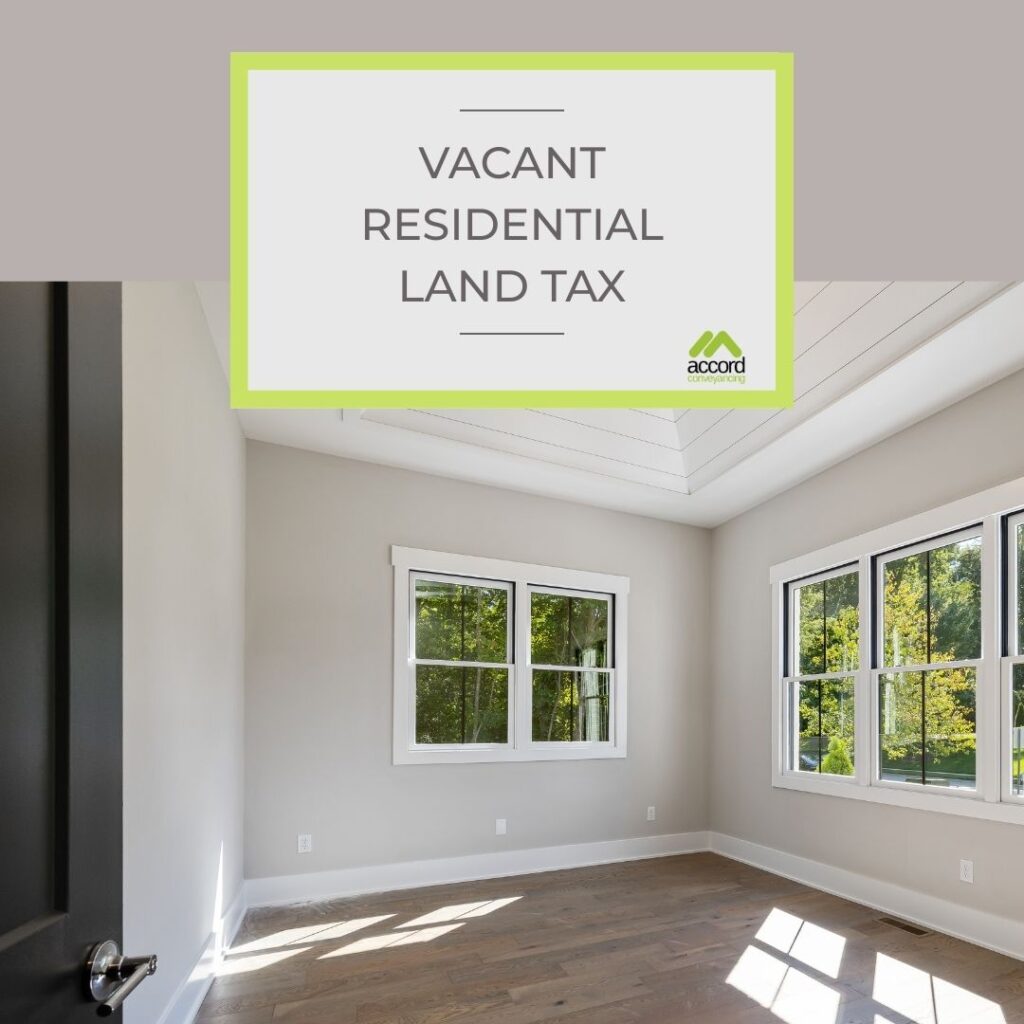Vacant Residential Land Tax
12 September 2025
Vacant Residential Land Tax: What You Need to Know as a Property Owner or Seller
If you own residential land in Victoria, there’s a lesser-known property tax that might affect you if your property has been sitting empty for all, or most, of the year. It’s called the Vacant Residential Land Tax (VRLT), and it can catch some owners and sellers by surprise.
At Accord Conveyancing, we believe in keeping our clients informed about every aspect that could impact their property ownership or sale. So let’s take a closer look at what the VRLT is, who it applies to, and what you can do to avoid unexpected costs.
What Is the Vacant Residential Land Tax?
The Vacant Residential Land Tax is an annual tax introduced by the Victorian Government to encourage property owners to make residential land available for use, either by living in it or renting it out.
It applies when residential land is left vacant for more than six months in a calendar year, even if those six months are not consecutive. It could also apply to residential land with a home on it that has been under construction or renovation for 2 years or more, or residential land that has an uninhabitable home on it for 2 years or more.
How is the Tax Applied?
Initially, the VRLT only applied to inner and middle Melbourne suburbs but as of 1 January 2025, the tax applies to all residential land across Victoria.
So if you own vacant land or a dwelling anywhere in Victoria, this tax might apply to you.
You are required to self-assess and notify the State Revenue Office (SRO) by 15 January each year if your property is liable.
If you’re planning to sell a vacant property, particularly in the early part of the year, you may still be liable for the tax from the previous calendar year.
Here’s what to keep in mind:
- The VRLT is assessed based on the ownership and occupancy of the previous year;
- The purchaser is not required to reimburse you any pro-rata amount of the VRLT, or even base land tax, at settlement.
How Much Is the Tax?
The VRLT is charged at 1% of the property’s capital improved value (CIV), which is the same value used for council rates.
For example, if your property’s CIV is $900,000 the tax could be $9,000 per year.
And there’s more: for properties left vacant multiple years in a row, the rate increases:
- 1st year vacant: 1%
- 2nd consecutive year: 2%
- 3rd and subsequent years: 3%
That’s a hefty cost for holding onto an unused property.
Holiday Home Exemptions
A holiday home may be exempt from VRLT if it is used by you, or close relatives, for at least 4 weeks of the calendar year – even if those 4 weeks aren’t consecutive.
Close relatives include spouse/partner, your children and their partners, your siblings and your parents or grandparents/grandchildren.
However, it is up to the State Revenue Office to be satisfied that your holiday home meets the relevant criteria which also includes the distance between the holiday home and your primary residence, the frequency of the use and the nature of the use.
Are There Any Other Exemptions?
Yes, there are some exemptions from the tax. These include:
- New homes that were unoccupied for up to 12 months after construction.
- Properties used as a holiday home, if it’s owned by a natural person and used by the owner or their relatives for at least 4 weeks of the year.
- Deceased estates, for up to three years after the date of death.
- Principal place of residence (your main home) — of course, this is exempt.
However, these exemptions often come with specific conditions, so it’s important to check the details or seek advice if you think one may apply to you.
What Should You Do?
✔ Review your property portfolio to see if any land or dwellings were vacant for more than 6 months in the past calendar year.
✔ Notify the State Revenue Office (SRO) by 15 January each year if your property is liable.
✔ Get professional advice if you’re unsure about your obligations or whether you qualify for an exemption.
Final Thoughts
The Vacant Residential Land Tax is designed to free up housing stock across Victoria, but it can become a costly surprise if you’re not prepared.
Whether you’re holding property, developing land, or getting ready to sell, it’s vital to understand your obligations and factor them into your plans.
Need help navigating the legal side of a property sale or purchase? Our team at Accord Conveyancing is here to guide you every step of the way.
